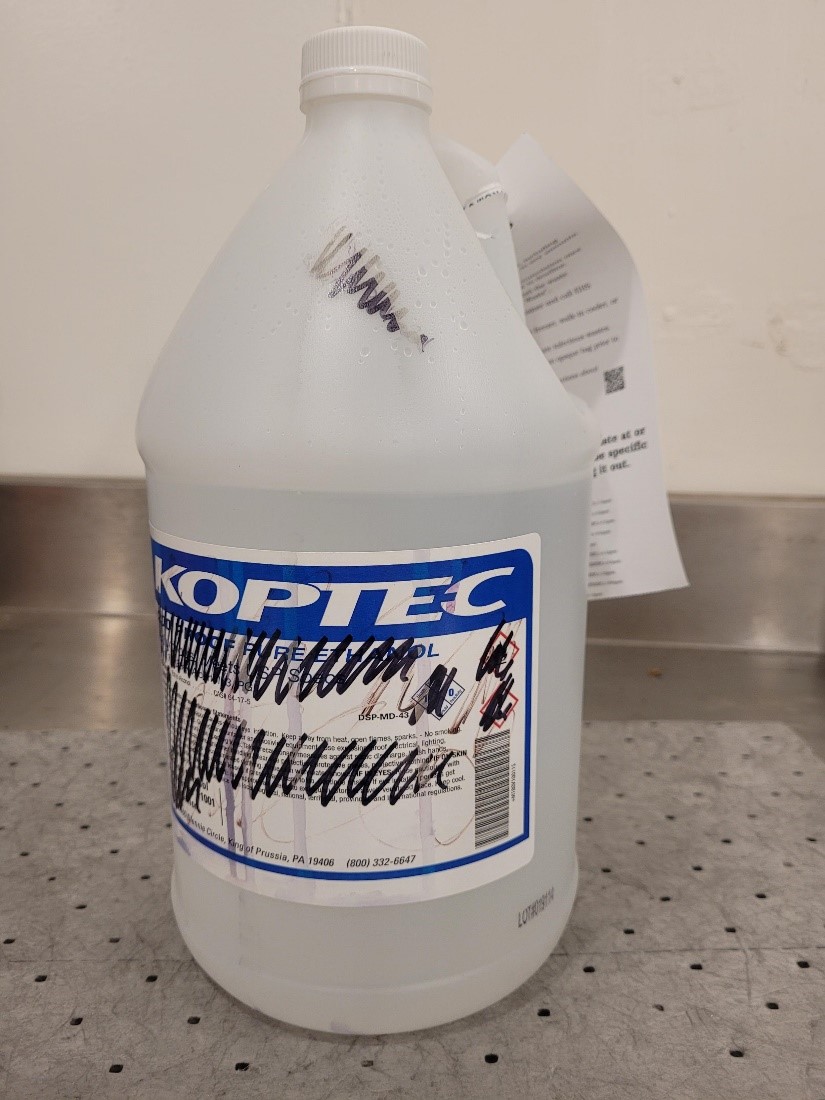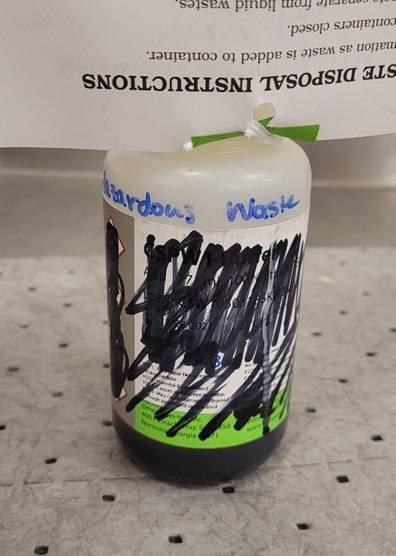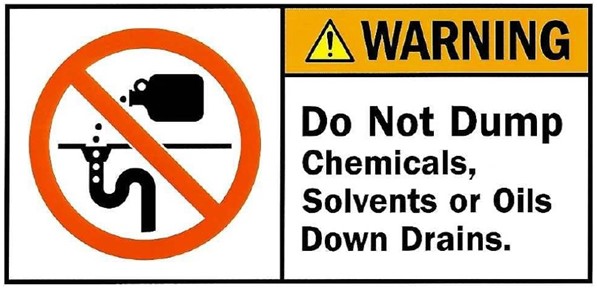Hazardous Waste Questions
Frequently-Asked Questions
-
Can I reuse reagent bottles for disposal?
Yes! Reagent bottles may be reused for hazardous waste disposal with the following conditions:
- Ensure the container held materials of the same state of matter as what you are producing, i.e. only use liquid reagent bottles for liquids, and solids for solids.
- Example: No solvents should be collected in an old sodium chloride bottle, as that is not rate for liquids and can risk spilling of the hazardous waste during transport or packing.
- Ensure container is compatible with type of waste being generated.
- Completely empty the bottle prior to use, either by air drying in the fume hood, or rinsing the bottle and collecting the rinsate in the hazardous waste container.
- Complete deface the existing label to eliminate confusion over the container’s contents.
- Attach a MSU Hazardous Waste tag with a twist tie, tape, or string to the container. The waste tag must be attached and not sitting next to the container.
- Place a “Hazardous Waste” label on the container. Printable "Hazardous Waste" labels (DOCX) are available on the Managing Chemical Waste page.


- Ensure the container held materials of the same state of matter as what you are producing, i.e. only use liquid reagent bottles for liquids, and solids for solids.
-
How do I know if my chemicals are incompatible?
In order to determine chemical compatibility, you must understand the hazards of the materials you are working with. Hazards can be identified by the Global Harmonization System (GHS) symbols on the reagent bottles, or on the Safety Data Sheet (SDS). EHS recommends this compatibility table (PDF) for reference, that identifies specific incompatible materials by chemical family.
In general, oxidizers, organic peroxides, and other reactives should be kept separate from other waste streams. Inorganic acids should not be mixed with organic materials, and acids should be kept separate from bases. If in doubt, reach out to the EHS Waste group for a consult.
-
What are the proper procedures for utilizing temporary waste containers, aka “Day Jars”?
EHS has established specific procedures and guidance for the use of Day Jars based on current federal and state regulations.
- Labels can be printed using Avery Label templates, OR onto regular paper and taped on the bottles.
- Day Jars MUST be emptied into the main hazardous waste container either at the end of the day, or the end of your shift, whichever comes first.
Inspections can often identify multiple violations per day per jar, so contact EHS for a waste consult if you have any questions about day.
See Managing Chemical Waste for more information and label templates.
-
How do I find guidance documents on how specific waste streams should be collected, stored, and disposed of?
EHS has established guidance documents for most waste streams generated on campus on the Guidance for Specific Types of Waste webpage. If you still have questions about waste disposal after reviewing the guidance documents, please reach out to EHS Waste staff at hazwaste@msu.edu and a member of the staff will contact you for a consult.
-
Can chemicals be disposed of down the sink?
No. Generally speaking, excluding the materials listed below, chemical waste must be disposed of through the MSU EHS hazardous waste program.
- Saline Solutions
- Glucose Solutions
- Buffer Solutions (pH range 5.5 – 10.0)
- Food Additive Solutions
- Soapy Water Solutions
- Bleach Solution (10% or less)
- Blood with De-active Culture
- Watercolor Dye Solutions
- Rinse Water Solution (Non-hazardous lab glassware)
- Disinfected Bio-waste (body fluids)
For specific questions regarding bio-waste, please refer to the MSU Biohazardous Waste Management Plan (PDF).Further guidance regarding MSU’s Sanitary Drain Discharge and Waterway Protection program can be found at http://msu-water.msu.edu/.

-
How do I dispose of glass slides?
Fixed Tissue – If the glass slides contain fixed or stained blood, cells, and tissues they can be securely packaged (i.e. cardboard box and tape) to prevent a cut hazard and placed in the general refuse trash regardless if they are intact or broken. If the slides are broken, please write “Broken Glass” on at least two sides of the box prior to disposing of the container.
Unfixed Tissue – If the glass slides contain unfixed or unstained blood, cells, and tissues, they will need to be placed in a red sharps container and submitted for pick up through the EHS Safety Portal regardless if they are intact or broken. Alternatively, the slides can be autoclaved in a solid walled container, and then securely packaged and placed in the general refuse trash.
-
What containers should be utilized to collect sharps waste?
All sharps waste must be collected in red medical waste containers. These containers are available for purchase from University Stores Spartan Marketplace. When logged into Spartan Marketplace, use the search function and search for “sharps”, which will bring up the various sizes of containers. The containers will come with proper sharps labels; however if you are in need of a new label, please contact EHS and one will be provided.
Note: EHS does not provide new sharps waste containers to Users when completing hazardous waste pickups. New containers must be ordered through Spartan Marketplace.
-
What containers should be utilized to collect pharmaceutical drug waste?
All pharmaceutical waste including solids, liquids should be collected in a black, leak resistant container. These containers are available for purchase from University Stores Spartan Marketplace. When logged into Spartan Marketplace, use the search function and search for “pharmaceutical”, which will bring up the various sizes of containers. The containers will come with proper pharmaceutical labels; however if you are in need of a new label, please contact EHS and one will be provided.
Note: EHS does not provide new pharmaceutical waste containers to Users when completing hazardous waste pickups. New containers must be ordered through Spartan Marketplace.
Contact Waste Team
For assistance with any of the following please send a message to the waste team, an email to hazwaste@msu.edu, or contact any member of the Hazardous Waste Staff directly.
- chemical waste generation, storage, or disposal
- waste consult from the MSU EHS Hazardous Waste staff
- hazardous waste training
- submitting a waste pickup request
- waste section website feedback

